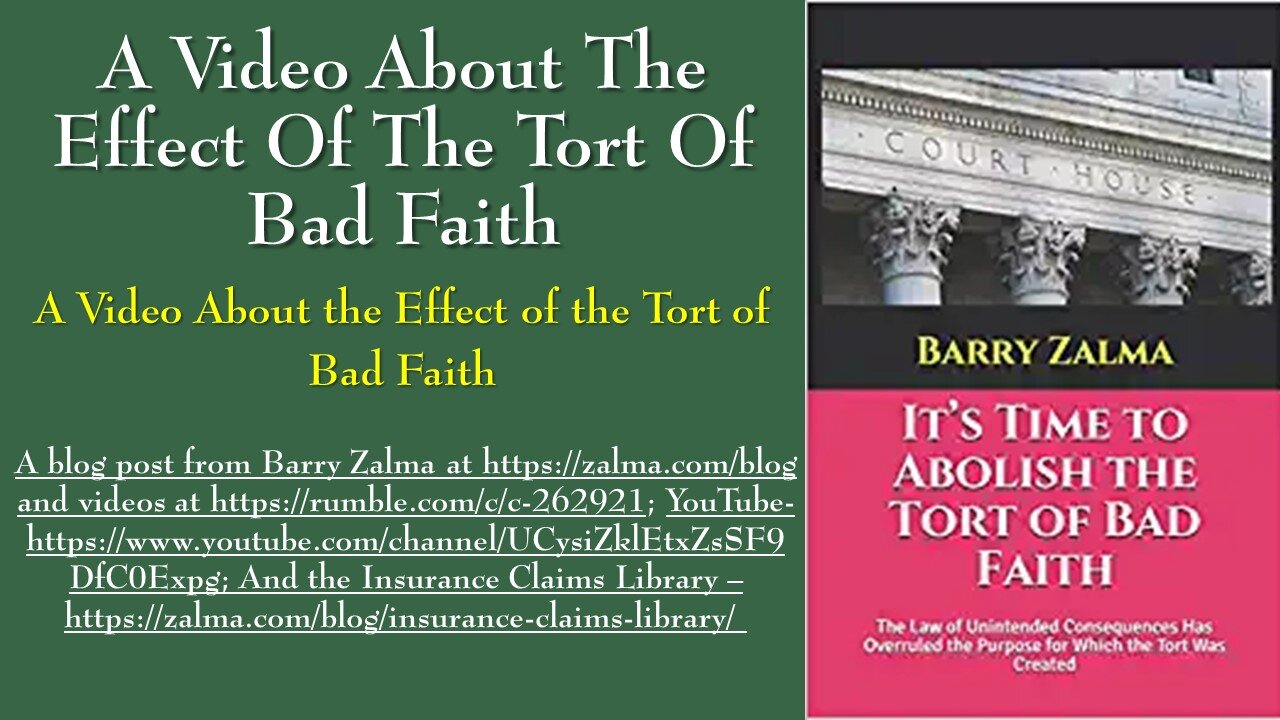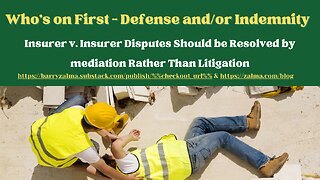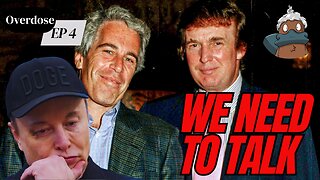Premium Only Content

The Effect of the Tort of Bad Faith
I
t is indisputable that in the 1950’s, 1960's and 1970’s the insurance industry abused some insureds to avoid paying legitimate claims. Without a factual basis, insureds were accused of arson or other variations on insurance fraud. Indemnity payments were refused on the flimsiest of excuses. People were found to have diseases that only horses could catch. Disability payments were refused because an insured was wheeled in her wheelchair to church one day and, therefore, was not totally house-confined. Insureds were driven into bankruptcy when reasonable demands within policy limits were refused.
To stop this abuse, the courts of the state of California invented the tort of bad faith. It took a universal contract remedy and decided that the breach of an insurance contract without, what the court decided was proper, genuine or even fairly debatable reasons, was transferred from a contract breach into a new tort. Many other states have followed the lead.
Until the invention of the tort of bad faith all that an insured could collect from an insurer that wrongfully denied a claim were the benefits due under the policy. After the creation of the tort of bad faith, the courts allowed the insureds to collect, in addition, the entire panoply of tort damages, including punitive damages.
The tort of bad faith, and the punitive damages that seem to go with it, have, in my opinion, served their purpose. Insurers now have professional claims departments. Insureds are almost universally treated with courtesy and respect. More than 90% of all claims are resolved without litigation or argument. Legitimate claims are paid with alacrity.
Insurance fraud continues to grow. The amount of money taken from insurers every year are in the tens or hundreds of billions of dollars. The fear of punitive damages has made the fight against fraud difficult and almost impossible. Even when an insured is arrested, tried and convicted of the crime of insurance fraud, or attempted insurance fraud. Attempts will still be made to sue the insurer for the tort of bad faith.
Before I retired from the practice of law, I contended daily with insurers who wanted to fight fraud but who found they must decide to pay a claim rather than face the exposure of a punitive damage judgment. Sometimes, the settlement of bad faith lawsuits, where there has been no bad faith and an appropriate denial of a claim or refusal to pay a policy limits demand, the insurer concludes it must pay more to avoid a potential run-away jury.
I can, as my mentors taught me 53 years ago, state with confidence the opinion that an insurer should spend millions of dollars for the defense of a non-covered or fraudulent claim and not a dime for tribute to an insured who brings a spurious bad faith law suit.
However, practical insurance professionals have a need to resolve litigation as inexpensively as possible to protect the shareholders who want the insurer to make a profit. As a result, the insurer will disobey the millions for defense covenant and will make a business decision to pay the non-covered loss or the fraud, rather than take a chance on an adverse verdict.
As with all things in insurance, the attitudes of insurers move in cycles. More often than not, I am now called upon to testify as an expert in bad faith cases that the insurer insists on taking to trial by jury rather than pay off a scofflaw.
I can only hope that this cycle continues and more attempts at fraud are defeated.
© 2021 – Barry Zalma
Barry Zalma, Esq., CFE, now limits his practice to service as an insurance consultant specializing in insurance coverage, insurance claims handling, insurance bad faith and insurance fraud almost equally for insurers and policyholders. He also serves as an arbitrator or mediator for insurance related disputes. He practiced law in California for more than 44 years as an insurance coverage and claims handling lawyer and more than 52 years in the insurance business. He is available at http://www.zalma.com and zalma@zalma.com.
Mr. Zalma is the first recipient of the first annual Claims Magazine/ACE Legend Award.
Over the last 53 years Barry Zalma has dedicated his life to insurance, insurance claims and the need to defeat insurance fraud. He has created the following library of books and other materials to make it possible for insurers and their claims staff to become insurance claims professionals.
Go to the podcast Zalma On Insurance at https://anchor.fm/barry-zalma; Follow Mr. Zalma on Twitter at https://twitter.com/bzalma; Go to Barry Zalma videos at Rumble.com at https://rumble.com/c/c-262921; Go to Barry Zalma on YouTube- https://www.youtube.com/channel/UCysiZklEtxZsSF9DfC0Expg; Go to the Insurance Claims Library – https://zalma.com/blog/insurance-claims-library/ Read posts from Barry Zalma at https://parler.com/profile/Zalma/posts; and the last two issues of ZIFL at https://zalma.com/zalmas-insurance-fraud-letter-2/ podcast now available at https://podcasts.apple.com/us/podcast/zalma-on-insurance/id1509583809?uo=4
-
 10:17
10:17
Barry Zalma, Inc. on Insurance Law
1 year agoWho's on First - Defense and/or Indemnity
191 -
 LIVE
LIVE
Anthony Rogers
1 day agoEpisode 370 - Past and Future Lives
278 watching -
 LIVE
LIVE
PudgeTV
2 hours ago⭕Gaming on Rumble | Team Scream Stream | R.E.P.O. on Rumble
65 watching -
 LIVE
LIVE
BigTallRedneck
2 hours ago$500 HALO TOURNAMENT PRACTICE
76 watching -
 1:15:00
1:15:00
Sarah Westall
5 hours agoCapturing You in the Matrix – Escaping the Surveillance State, the Real & Digital ID w/ Twila Brase
28K3 -
 LIVE
LIVE
SpartakusLIVE
7 hours ago$18,000 WZ Total Frenzy Tournament || #1 Champion returns to DOMINATE yet another COMPETITION
1,008 watching -
 LIVE
LIVE
HELMETFIRE
51 minutes ago🟢More night less reign.. or something! 🟢 RUMBLE TAKEOVER! 🟢
47 watching -
 2:16:57
2:16:57
RiftTV/Slightly Offensive
5 hours agoElon Goes NUCLEAR on President TRUMP.. Is This THE END For Musk? | The Rift | Guest: Viva Frei
36.3K22 -
 1:47:39
1:47:39
Alternatively - Formerly Conspiracy Pilled
5 hours agoWE NEED TO TALK ABOUT ELON AND TRUMP
43.9K22 -
 1:06:59
1:06:59
The Daily Signal
3 hours ago🚨 DEVELOPING: The Trump / Musk Feud and What It Means for YOU
29.6K5